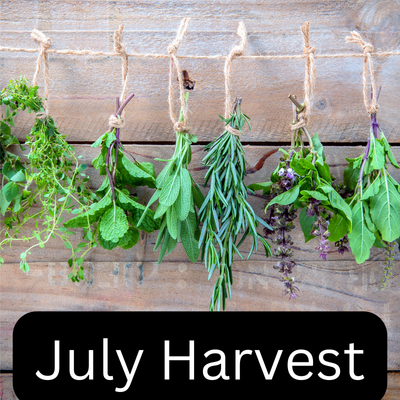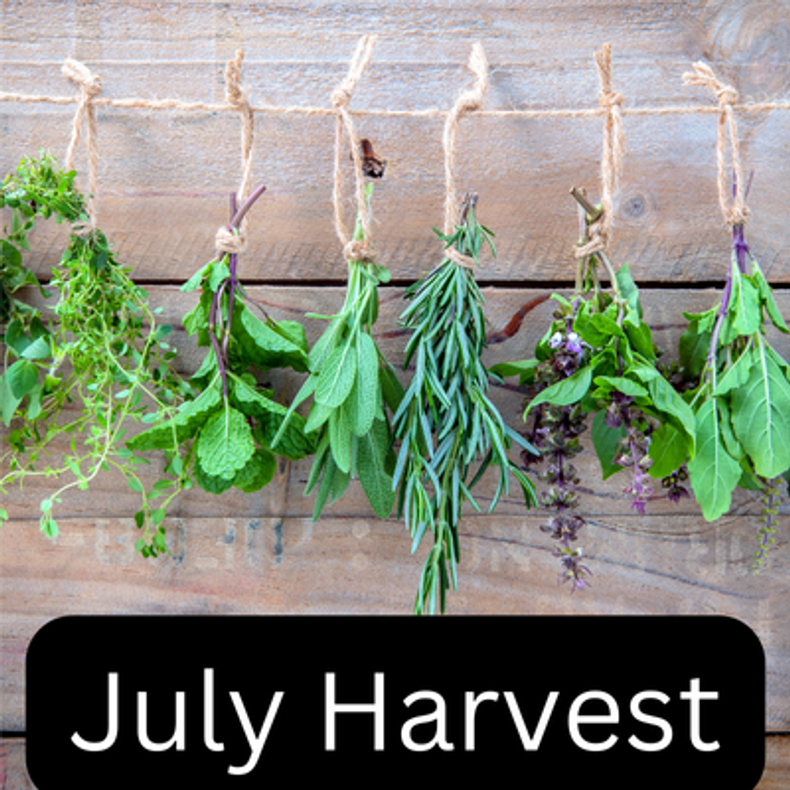
July Harvest: Culinary Herbs
July is a wonderful time for herb enthusiasts, especially those who enjoy cooking. The warm weather and long days provide the perfect conditions for harvesting a variety of flavorful herbs. Here, we’ll explore three essential culinary herbs that reach their peak in July: basil, oregano, and thyme. These herbs not only add vibrant flavors to your dishes but also offer numerous health benefits. Don't forget to save some of the herbs you harvest for spiritual uses as well.
Basil
Basil is a staple in many kitchens, known for its sweet, slightly peppery flavor with a hint of mint and clove. It’s a key ingredient in Mediterranean and Asian cuisines. There are many varieties of basil, so don't be afraid to try them! How can you cook with basil:
- Pesto: Combine fresh basil leaves with garlic, pine nuts, Parmesan cheese, and olive oil to create a classic Italian pesto sauce.
- Caprese Salad: Pair basil with ripe tomatoes, mozzarella, a drizzle of balsamic vinegar, and olive oil for a refreshing summer salad.
- Thai Dishes: Use basil in Thai curries and stir-fries to add a fragrant, herbal note.
Health Benefits:
Basil is rich in antioxidants, vitamins, and minerals. It has anti-inflammatory properties and can aid in digestion. The essential oils in basil also have antimicrobial effects, making it beneficial for overall health.
Harvesting Tips:
Pick basil leaves in the morning after the dew has dried. Regular harvesting encourages the plant to produce more leaves. Pinch off the top leaves to prevent the plant from flowering, which can make the leaves bitter. Basil is an annual, so as long as you harvest before it flowers, you can keep harvesting.
Oregano
Oregano is a robust herb with a strong, earthy flavor and a hint of bitterness. It’s widely used in Italian, Greek, and Mexican cuisines.
- Pizza and Pasta: Sprinkle oregano on pizza and pasta sauces to enhance the savory flavors.
- Greek Salad: Add oregano to Greek salads with feta cheese, olives, and cucumbers for a traditional touch.
- Marinades: Use oregano in marinades for meats and vegetables to infuse them with a rich, herby taste.
Health Benefits:
Oregano is packed with antioxidants and has powerful antibacterial and antifungal properties. It’s also a good source of vitamins A, C, and K, as well as iron and manganese. A great way to get the health benefits from oregano is to make an infused oil from slightly wilted leaves that you can use during cold and flu season.
Harvesting Tips:
Harvest oregano just before the plant flowers for the best flavor. Cut the stems in the morning and hang them in a dry, well-ventilated area to dry. You can also use fresh oregano in your recipes or freeze it for later use.
Thyme
Thyme has a delicate, earthy flavor with floral hints. It’s a versatile herb that complements a wide range of dishes.
- Roasted Meats: Add thyme to roasted meats like chicken, beef, and lamb for a savory, aromatic touch.
- Soups and Stews: Use thyme in soups and stews to enhance the depth of flavor.
- Vegetables: Sprinkle thyme over roasted or sautéed vegetables for an added layer of flavor.
Health Benefits:
Thyme is known for its antiseptic and antibacterial properties. It’s also a good source of vitamins C and A, iron, and manganese. The essential oils in thyme can help relieve respiratory issues and support the immune system. Making a tea from thyme can really help during cold and flu season.
Harvesting Tips:
Cut thyme just before it flowers for the best flavor. Snip the stems in the morning after the dew has dried. Thyme can be used fresh or dried for later use. Drying thyme is easy: simply hang the stems in a cool, dry place until the leaves crumble easily.
July is the perfect time to harvest these three culinary herbs. Basil, oregano, and thyme not only elevate the flavors of your dishes but also provide a range of health benefits. By incorporating these fresh, home-grown herbs into your cooking, you can enjoy the full bounty of the summer season. Happy harvesting and cooking!

